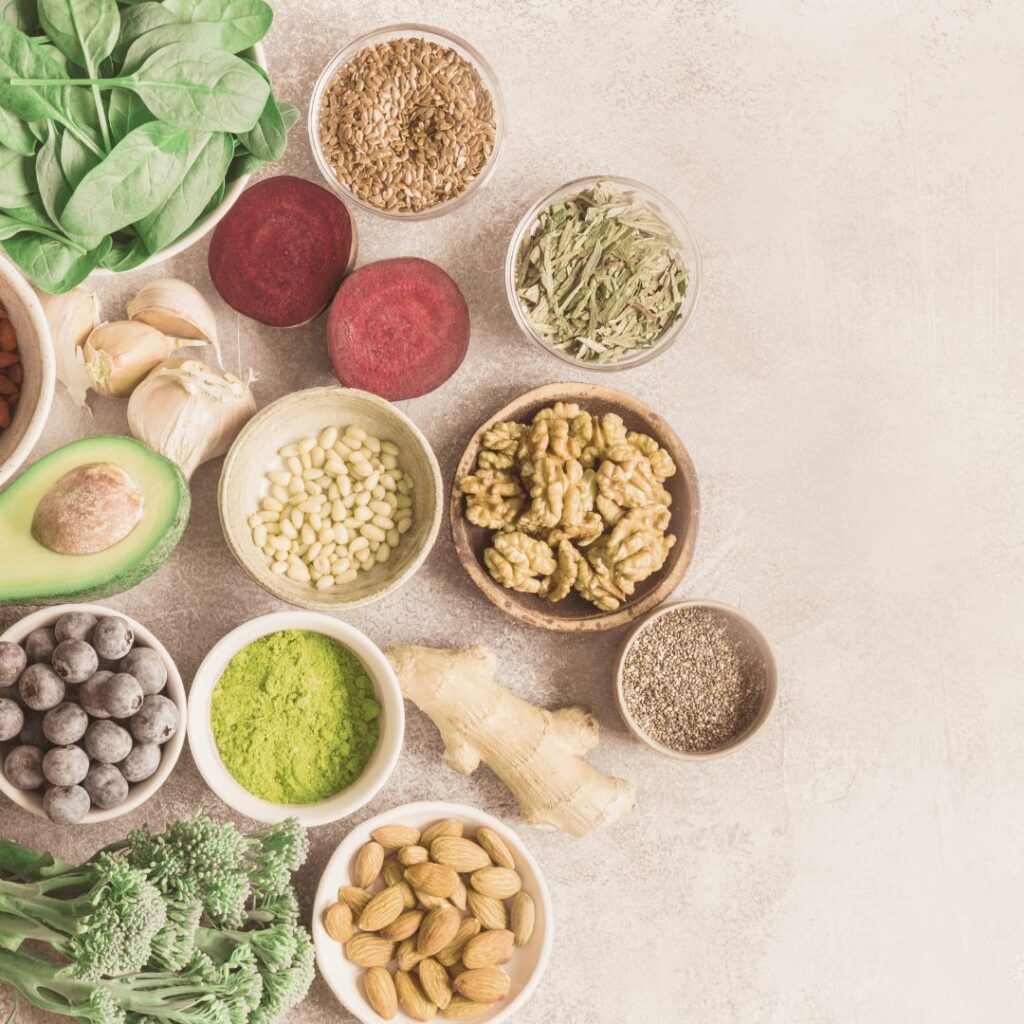As you head into 2024, at lot of people are asking how to improve gut health. There is a plethora of information out there backing up the fact that looking after your gut health is crucial for overall well-being. A healthy gut aids digestion, supports our immune system and mental health, contributes to our energy levels and more.
Improving gut health is key to holistic wellness. In this blog post, I will outline some of the reasons why gut health is important for your mental health, nutrient absorption, brain development, and inflammation. I will also discuss signs of an unhealthy gut and ways to improve this.

Why is gut health important?
Before we dive into how to improve your gut health, I want to start with some of the reasons why it is so important. When we think of gut health, most people think of whether or not they are eating ‘healthy’ foods or ‘junk’ foods. This blog article is not necessarily about that, it is about the health of your gut microbiome.
When I refer to a ‘healthy gut’ I mean microbiota symbiosis. If your gut microbiota is in a state of dysbiosis it can wreak havoc on your overall health. For the purpose of todays blog article, I have listed 4 reasons that your gut health is so important.
MENTAL HEALTH

One main reason that it is so important to improve gut health, is the impact it has on your mental health. I don’t know why no-one ever told me this! I honestly had no clue that this could even be possible. Have you heard of the Gut-Brain Axis? It is a bidirectional communication pathway between your gut and brain.
I always knew that my stress levels impacted my gut. Feeling anxious or stressed would usually lead to some pretty terrible IBS symptoms. But, I didn’t know that the health of my gut was also sending signals back up to my brain.
The complex network in the gut-brain axis involves the central nervous system and the enteric nervous system (located in the gut). It also involves trillions of microbes residing in your gut, collectively known as your gut microbiota.
This bidirectional communication influences various aspects of your mental health, including mood, stress response, anxiety levels, and cognitive function. Most of Your serotonin, (the neurotransmitter that regulates mood and happiness) is produced in the gut.
A healthy gut promotes optimal serotonin production, thus leading to improved mood and a sense of well-being. Supporting a diverse gut microbiome through a balanced diet and the consumption of pre and probiotic-rich foods can positively influence serotonin levels. So if you ever think that what you eat has nothing to do with the state of your mental health, think again.
nutrient absorption

A healthy gut is essential for proper nutrient absorption. You may think you are being ‘healthy’ by eating certain foods. However, if your body is not absorbing nutrients from food, you probably won’t see an improvement in your health.
Nutrients such as omega-3 fatty acids, B vitamins, magnesium, and zinc are crucial for brain health and the production of neurotransmitters. Improving gut health ensures optimal nutrient absorption, providing the necessary building blocks for a healthy brain and improved mental and physical functioning.
If you body is not receiving adequate nutrients, you will be left with a list of symptoms. Malabsorption syndrome is one of these. There are specific diagnostic tests that can diagnose this, it’s not necessarily what you have if you are constantly fatigued. However, it is important to note that your body is very complex. The way it absorbs nutrients from food and how these nutrients work together to give you energy, health bones, and help you think, is fascinating.
BRAIN DEVELOPMENT

Emerging research suggests that the gut microbiota plays a role in early brain development and may influence cognitive function throughout life.
A healthy gut during infancy and childhood is associated with improved cognitive abilities, better emotional regulation, and a reduced risk of mental health disorders later in life.
But, if you’re thinking you can just focus on your child and not worry about yourself, think again! Did you know that your first inoculation of microbiome comes from your mother during birth? So, if you’re thinking of having a baby in the future, improving your gut health will be beneficial for both of you an your child.
INFLAMMATION

Chronic inflammation in the body, often caused by poor gut health, has been linked to the development of mental health disorders such as depression and anxiety. Unhealthy gut microbiota can also contribute to increased inflammation and impaired immune function. This inflammation can potentially affect brain function and other unpleasant symptoms.
Many of us live with chronic inflammation without realising it. I know I did! There are a lot of conditions associated with chronic inflammation, which are listed here. Basically, you want to try to avoid chronic inflammation as it is associated with autoimmune diseases, IBS, certain cancers and more.
By adopting a gut-friendly diet and reducing processed foods, you can reduce inflammation. Thus supporting you in with your mental health, brain function, gastrointestinal health and much more.
So now you have an idea of why having a healthy gut is so important. Let’s take a look at some of the signs that you may need to improve your gut health.
Signs of an unhealthy gut
The list below is not complete with every single symptom of an unhealthy gut. I’m also not suggesting that any of the below symptoms are only caused by an unhealthy gut. So, please do your research and don’t assume that having a headache means you have an unhealthy gut.
This list is merely to demonstrate just how important your gut health is. An unhealthy gut has been linked to sooooo many problems that we face on a daily basis. It’s always worth exploring!
- Bloating, gas, heartburn and reflux
- Brain fog, forgetfullness
- Depression, anxiety and other mental health concerns
- Thinning hair, dandruff
- Dermatitis, psoriasis, rash, eczema
- Joint pain, arthritis
- Irritable Bowel Syndrome, constipation, diarrhea
- Migraine and Headache
- Insomnia, sleep problems
- Unintentional weight gain or loss
- Fatigue
- Food intolerances
- Sugar cravings
Years ago, I could have ticked every single symptom….and still had zero knowledge about gut health! Please know that when I share this information, it is not to make you feel bad. I’m sharing it because gut health may not be something you have considered as being a contributing cause to your symptoms. This is purely to help you in your own health and wellness journey.
So, if you think it’s worth investing some time into exploring your own gut health, keep reading. The good news is there are several practical steps you can take to improve your gut health. Let’s get into that now.
6 ways you can improve your gut health
1. proritise fibre in your diet

Increase your fibre intake by incorporating whole grains, legumes, fruits, and vegetables into your meals.
If your body is not used to eating a lot of fibre, start slow and gradually introduce fibre to your diet to allow your body to adjust.
Remember to drink plenty of water along with your fibre-rich meals to support smooth digestion. Some fibre rich foods can be found here.
2. ensure you include prebiotic and probiotic foods

Fermented foods are teeming with pre and probiotics, which are beneficial bacteria that support a healthy gut.
Include foods like garlic, yogurt, kefir, sauerkraut, kimchi, and tempeh in your diet. This can help replenish and maintain diverse gut microbiota. This aids in digestion and promotes a balanced gut environment.
Although, if you are like me – there may be some prebiotic foods (hello Garlic) that are difficult for your body to digest. This doesn’t mean you should avoid these foods, but seeing a Nutritionist might be a good starting point.
I used to take a Synbiotic capsule as a supplement for what garlic and other prebiotics foods would do for my gut. It worked wonders for me. However, every body is different and you should seek advice from a health professional before starting any supplement.
3. reduce the amount of processed foods/added sugars

If you love sugar like me, you will hate hearing this. But processed foods, high in refined sugars and artificial additives, can disrupt the balance of gut bacteria. This imbalance then leads to issues like inflammation.
Reduce your consumption of packaged snacks, sugary beverages, and fast food. Prioritise whole, unprocessed foods whenever possible.
The closer to ‘as natural as possible’ the food source is, the more likely it is to provide essential nutrients without the harmful additives that can harm gut health.
This doesn’t mean avoiding these foods entirely, we need to be able to enjoy food and not have strict rules about what is ‘good’ and ‘bad’ – but, just keep in mind that it is wise to reduce the amount of highly processed foods for the sake of our gut health. Some examples of highly processed foods can be found here.
4. stay hydrated

Adequate hydration is vital for maintaining optimal gut health. Water helps break down food, aids in nutrient absorption, and supports regular bowel movements.
Aim to drink at least eight cups of water per day (or whatever is best for your body) and adjust your intake based on activity levels and climate.
Another way to know if you are dehydrated is by looking at the colour of your urine, and noticing if you have a headache.
When thinking of your water consumption for the day, remember that water in tea or coffee does not count.
5. reduce stress (as much as you can)

As you are probably well aware, chronic stress can have detrimental impacts on our health. It can also affect the gut-brain axis quite severely.
Practice stress-management techniques such as meditation, deep breathing exercises, regular physical activity, and engage in activities you enjoy.
Prioritising self-care and adopting healthy coping mechanisms really is vital for your gut health! I used to think that doing one ‘self care activity’ every now and then was enough. It really isn’t though. To reduce stress, you really need to engage in daily self-care strategies. Even if it is just a short amount of time before and after work.
6. prioritise sleep

Quality sleep is often overlooked but it is essential for overall health, including gut health. There have actually been studies that have shown the relationship between quality sleep and increased microbiome diversity!
Having enough sleep is also important because you are less likely to crave sugary, caffeinated foods. Thus making it easier to prioritise whole foods over highly processed foods.
Aim for seven to eight hours of uninterrupted sleep each night (or whatever amount is optimal for you). Establish a relaxing bedtime routine, create a sleep-friendly environment, and limit exposure to electronic devices before bed to ensure a restful night’s sleep.
7. move your body

Physical movement is important for our overall health and wellbeing. It doesn’t have to be daily gym sessions or running a marathon! A 30 minute walk each day can have enough of a positive impact for your gut health. Click here to read more about this.
Moving our body each day is important for the function of our digestive system. So, if you have IBS or other digestive issues, mild to moderate exercise may be helpful. If you would like to read more about why exercise is helpful, click here.
8. limit alcohol and avoid smoking

Over consumption of alcohol and smoking cigarettes will have an impact on your health. That is probably obvious. However, the impact these drugs have on our gut health may not be. I’m not going to lie and say I never drink. I do drink alcohol, however I don’t binge drink like I did in my 20s and my gut is very happy about it! If you are interested, read here to learn more about the impact of binge drinking.
With regard to cigarettes, this study discusses the link between smoking and microbiota dysbiosis. The link between smoking cigarettes and microbiota dysbiosis is still being heavily researched. However, there is a tonne of information about the negative impacts of cigarettes. You can read more about the impact of cigarette smoking on the digestive system here.
9. dont overuse antibiotics (unless necessary)

Antibiotics are most certainly needed for our health. They are absolutely necessary in a lot of circumstances. However, overuse of antibiotics does have an impact on the health of your gut. You may also think that taking a probiotic supplement after a course of antibiotics will ‘straighten it out’. Well, that’s certainly what I used to think! But, there are a few reasons why this is not necessarily the case.
Taking a probiotic supplement from the chemist may not be as beneficial for you as you think. One reason for this is the beneficial bacteria may not survive through the acidic environment on the way down to your gut. For our gut to be healthy, we need both prebiotics and probiotics. So, for me taking a synbiotic capsule was helpful. The prebiotic capsule helped protect the probiotics through the acidic environment.
Please seek your own advice when considering how to restore gut health after prolonged antibiotic use. What has helped me may not help you. Every body is different.
10. limit artificial sweeteners

Whilst consuming artificial sweeteners may be a good option for some, it is important not to overdo it. Some artificial sweeteners can change the composition of gut microbiota.
Studies have shown that some artificial sweeteners can have a negative impact on blood glucose levels. If you are interested in learning more about this, here is a fascinating read.

I hope this article has helped you to understand the importance of a healthy gut. The intention is not to make you fear everything or feel bad about yourself. It is to show you why gut health is important and how to improve gut health.
Do you notice any symptoms that might suggest that you need to improve your own gut health? What will you do to start working on this?
Are you looking for more support with your health and wellness? If so, I’d love to help you. Click here to book in an online session. If you prefer to email, I LOVE receiving emails and I respond to all of them, so if you have any questions or ideas, please email me at rebecca@theorchardrose.com.


